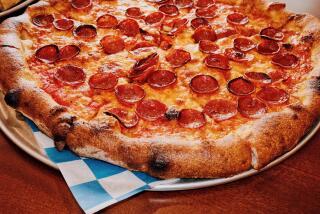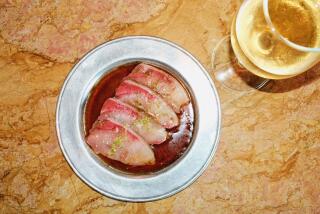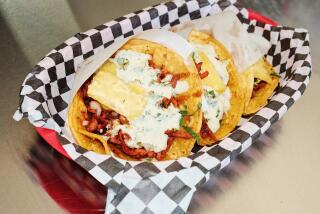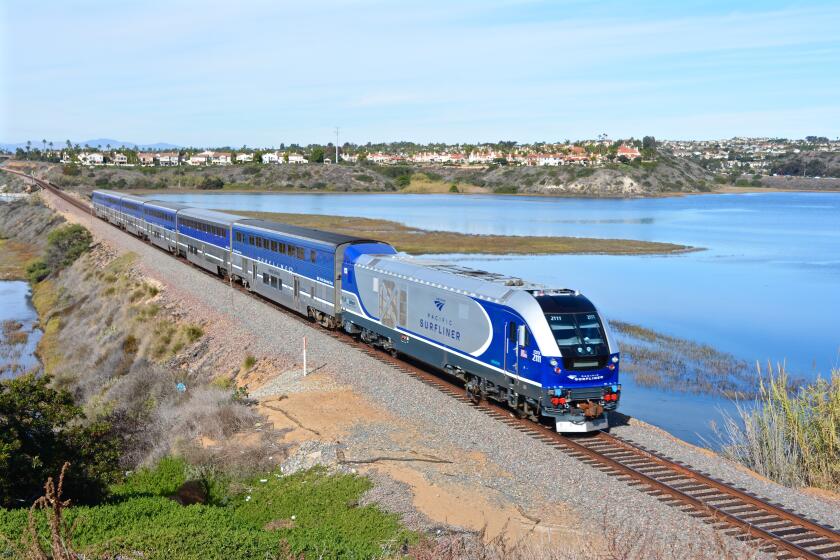Kobe-Style Beef Carves a Niche in U.S.
- Share via
MABANK, Texas — For the first time in four years, a gourmet extravagance -- authentic Japanese Kobe beef -- is allowed back into the United States.
The question is whether anyone will care. An American “Kobe-style” brand has taken its place on restaurant menus.
“We cannot meet demand,” said Todd Hatoff, president of Allen Bros., which sells the premium beef to fine restaurants. “I don’t see it going away, ever. It’s not a fad.”
Kobe beef is the essence of fine dining: The meat bursts with flavor, and the fat melts like butter and coats the mouth. The best American Kobe-style steak will cost $80, $90, even $100 at a high-end steakhouse. A Kobe-style hamburger can run $40.
It tastes good because of the fat. The meat is streaked so thickly with fat that the Japanese call it “white steak.” When it’s cooked, the fat melts into the meat, infusing it with flavor.
“It’s very rich, very fullflavored,” said Tom Schneller, assistant professor at the Culinary Institute of America. “This is the cream of the crop.”
The U.S. banned Japanese beef after mad cow disease was discovered there in 2001. Officials ended the ban last month, after Japan ended its own embargo on American beef.
Legend has it that Japanese Kobe cattle are fed beer, massaged with sake, even soothed with soft music. Experts say that beer has been used to stimulate their appetites and that sake makes for a glossy coat, on which they are graded.
But that is not how it’s done in the U.S.
“It’s a great story, and we don’t go out of our way to dispel the myth, but it’s really not necessary,” said Jay Theiler, president of Idaho-based Snake River Farms. “The two things that make Kobe-style beef are genetics and a long feeding program.”
It starts with the cows. True Kobe beef comes from the region surrounding the Japanese city of that name.
The American version of Kobe beef comes from the same breed of cattle raised in Japan. The animals, called wagyu, or “Japanese cattle,” began arriving in the United States in the 1990s, often aboard airplanes.
They are fattened for much longer than the average American breed -- they live about 26 to 32 months, compared with 18 months for U.S. beef cattle. American ranchers often crossbreed them with Angus cattle.
The beef they produce is considered better than prime -- the highest grade given by the U.S. Department of Agriculture. The label is for meat that is abundantly marbled with fat. Restaurants and hotels get most of the prime beef; only a small amount is sold in supermarkets.
Texas cattleman Gary Yamamoto said that at least 97% of his Kobe-style wagyu beef was prime. Nationwide, only about 2% of beef earns the rating.
The glossy black cows and calves grazing on Yamamoto’s rolling hills look like any other beef cattle. It’s hard to tell the full-blood wagyu apart from Angus cows that Yamamoto uses for crossbreeding.
He started with a small herd -- 88 cows and 10 bulls -- bought from a Japanese rancher. The rancher, Shogo Takeda, had flown them to the United States so he could sell embryos and calves more easily to Australia, another country where Kobe-style beef is flourishing.
Yamamoto bought the entire herd in 1999; Takeda still advises him and visits his ranch about 55 miles southeast of Dallas.
Yamamoto’s Kobe enterprise began because he was looking for a property tax break that came with grazing livestock or planting trees.
“Once I got into it and learned all the aspects -- the health as well as the good taste -- I was hooked,” Yamamoto said.
Healthy beef? Healthy, fatty beef? Absolutely, Yamamoto said -- he helped fund research that backs up his claim. A Texas A&M; University researcher, Stephen Smith, concluded that compared with American beef, wagyu beef is much higher in unsaturated fat. It has high levels of oleic acid, the fatty acid in olive and canola oils that has been shown to lower LDL, or “bad,” cholesterol.
“The health aspect of this animal is what should be the standard for the U.S. cattle herd,” Yamamoto said.
“If I can put these bulls on any breed and decrease the saturated fat, that would be the standard.”
Another selling point for Kobe-style beef is that it is often raised without hormones or antibiotics. Still, some ranchers believe that indulgence is the biggest selling point.
“This is a fine dining experience. Something like a fine steak is really, really a joy to eat,” said R.L. Freeborn, president of Oregon-based Kobe Beef America.
More to Read
Sign up for The Wild
We’ll help you find the best places to hike, bike and run, as well as the perfect silent spots for meditation and yoga.
You may occasionally receive promotional content from the Los Angeles Times.






